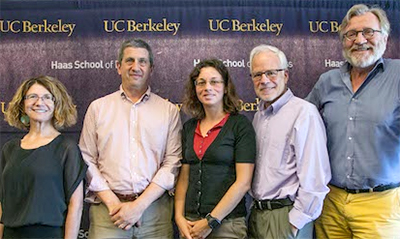Featuring:
- Panel moderator Maria Carkovic, executive director of the Institute for Business Innovation
- Andrew Rose, Bernard T. Rocca, Jr. Chair in International Business & Trade and a member of the Economic Analysis & Policy Group at the Haas School of Business.
- Galina Hale, research advisor at the San Francisco Federal Reserve Bank
- Barry Eichengreen and Gerard Roland, UC Berkeley professors of Economics & Political Science
Highlights:
One primary concern with Brexit is its impact on international trade. About half of all British exports go to countries in the EU, according to Rose. By comparison, only about one-tenth of the EU’s exports enter the U.K. Rose says that’s a big deal because the U.K.’s trade deficit has been growing and Brexit will cause a long period of trade stagnation.
“Most of the estimates from academics say the Brexit disruption to the trading system is going to lead to around a two percent drop in GDP,” Rose said. “The long run effect is going to be larger because Brexit will create a more closed economy in the U.K..”
Rose says he expects the exit term negotiations between the U.K. and EU will be “painstaking and politically fraught” and will likely take more than the allowed two years.
Prof. Andrew Rose says he doesn’t expect a large collapse of living standards in the UK.
“Free trade agreements aren’t really that important,” he says. “Most trade barriers are already limited. Non-tariff barriers are always protected by special interests and that’s why trade negotiations take a long time. I don’t expect a large collapse of living standards in the U.K. It will be far less than 20 percent.”
Hale spoke about Brexit’s impact on the financial sector, including the possible reduction of labor and capital mobility. It may be more expensive for financial institutions to bring highly-skilled foreigners to the U.K., one of the world’s central financial hubs. However, she said the impact on U.S. banks will likely be limited to legal and relocation costs, even if the U.K. does lose its financial hub status.
Macroeconomic fallout will depend on whether the historical relationships among countries continue. The Bank of England, the U.K.’s central bank, will have to ride the wave of uncertainty, Eichengreen says.
“Slightly lower interest rates and more quantitative easing are not likely to help much when the main cause of an economic slowdown in the U.K. is high uncertainty, which makes firms reluctant to invest,” says Eichengreen.
Brexit’s impact on the political economy is equally uncertain, but Roland said he believes it will have bearing on the refugee crisis and EU governance.
“Maybe the EU’s governance system is not the right one for Europe,” says Roland. “Perhaps an elected EU president will compensate for the current democratic deficit within the EU.”
